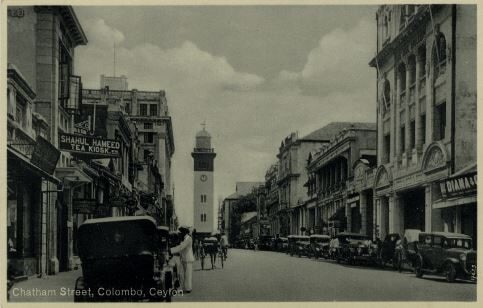Al Fazl, 11 September 1923

This news will be heard with great delight that the ban on the entry of Ahmadi missionaries into Ceylon imposed due to the pointless efforts of the opponents, which had been in effect since 1915, has been lifted by the Government of Ceylon under certain conditions. Although some of these conditions are very harsh and a constraint on true freedom, we hope that when the peaceful and law-abiding nature of the Ahmadi missionaries becomes clear to them, the authorities of Ceylon will no longer be deceived by these people who continue to submit false reports against Ahmadis due to their enmity and hate.
An English newspaper, Times of Ceylon, in its issue of 22 August 1923, published the proceedings of the Colombo Ahmadiyya Jamaat’s meeting following the Government of Ceylon’s letter allowing missionaries to enter Ceylon on certain conditions.
After mentioning the re-launch of the Ahmadiyya newspapers, The Message (English) and Thuthan (Tamil), and highlighting the monetary sacrifices of Ahmadi women of Ceylon Jamaat for the Ahmadiyya Mosque in Berlin, the aforementioned [Times of Ceylon] writes:
“Then, the Secretary [of Ahmadiyya Jamaat Colombo] presented the following letter from the Government [of Ceylon]:
“‘From: The office of Colonial Secretary, Colombo. 26 July 1923
“‘To: Honourary Secretary Ahmadiyya Association Ceylon, 30 Shorts Rd., Colombo
“‘Dear Sir! In regard to your letter of 9 July 1923 about the restrictions on the Ahmadi Muslim missionaries by the Colonial Secretary, I am directed to inform you that His Excellency, Honourable Governor, has happily ordered for the Ahmadi missionaries that the prohibition against their entry into Ceylon be removed and that they may enter Ceylon on the following conditions:
The meetings in which these missionaries deliver their addresses and lectures should be held at the headquarters of the Ceylon Ahmadiyya Jamaat, located in the city of Colombo on Ceilão Island.
These missionaries are not allowed to hold any sermons or meetings in the streets.
All such missionaries shall appear in person within 24 hours of their arrival on the island and report their arrival at the office of the Colonial Secretary. These missionaries must accept these conditions and give a written agreement to the Colonial Secretary that if they violate these conditions, they must immediately leave the island, provided they are ordered to do so.
“‘Yours sincerely, HR Blood, Deputy Colonial Secretary.”
In this regard, the following resolution was proposed to be submitted to the Government.
All members of the Ahmadiyya Jamaat, who assembled at their Association Hall, Shorts Rd., Colombo, on 18 August 1923, express their sincere gratitude to Governor Bahadur. He generously revoked all the stay orders issued in 1915 regarding the entry of Ahmadi missionaries into the island.
However, we also regret that some [harsh] conditions have been imposed, apparently due to some misunderstanding, but it is our duty as Muslims to obey the orders of our authorities and remain loyal to the government. On the other hand, Ahmadiyya Jamaat is that religious movement that has missionaries spread all over the world.
We hope that the government gets convinced without our raising our voices and removes the conditions imposed on us at some point in the future.
The British government openly claims that it has given religious freedom to the people of every religion and nation. We believe that under the same claim, the Government of Ceylon has revoked the prohibition of entry of Ahmadi missionaries into their country. But there is also a need to remove the conditions that have been imposed upon us, and just as the followers of other religions are allowed to preach their own faith freely, so should the Ahmadis [be permitted]. Ahmadi missionaries belong to a very peaceful sect. They do not participate in any movement against the government. They do not interfere in political matters. They consider all human beings as their brothers and deem it their duty to keep trying for their betterment and prosperity. It can never be appropriate to impose any kind of restrictions on such people. We are hopeful that the government will soon remove these restrictions and give the Ahmadiyya Jamaat an opportunity to express more gratitude.
The Ahmadi members of Ceylon Jamaat, where it is gradually becoming easier for them to spread the truth, should also increase their preaching efforts. While avoiding the occasions of conflict and mischief, they should satiate the thirst of all the seekers of truth and pious people with the fountain of Ahmadiyyat.
Some time ago, the Ahmadis of Ceylon showed great zeal and fervour in the propagation of Ahmadiyyat. They set a great example in making all kinds of financial and personal sacrifices. But after that, laziness crept upon them, and the earlier enthusiasm did not remain. It is certainly far from the honour of a believer that their steps stop at a certain stage of progress, let alone that they tend to decline. Thus, the Ahmadis of Ceylon should try their best to remove the laziness and shortcomings that have occurred in their preaching efforts, so that God may see their zeal for preaching and provide them with more facilities and means of progress.
(Translated by Al Hakam from the original Urdu, published in the 11 September 1923 issue of Al Fazl)

